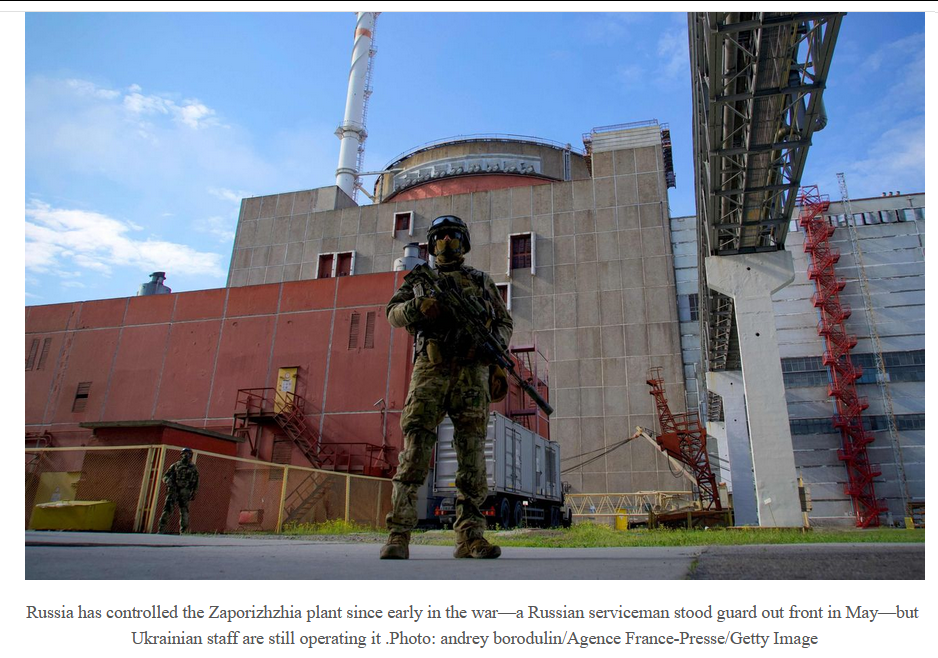
The international crisis over the weekend shelling of Europe’s largest nuclear power plant deepened on Monday as Russia and Ukraine traded blame for missile attacks and the United Nations secretary-general warned that an attack on a nuclear facility would be suicidal.
Plant staff and Ukrainian officials and diplomats following the case said Russia appears to be trying to steal the nuclear plant, Europe’s largest, by disconnecting it from the Ukrainian national electrical grid and eventually reconnecting it to Russia’s—and abducting and assaulting technicians who oppose that project.
The changeover would be costly, time-consuming and of limited benefit to Russia, which has already had a considerable supply of nuclear power. But it would be a potent and symbolic victory for President Vladimir Putin six months into his increasingly costly and grinding invasion of
No nuclear plant has ever been occupied, nor transferred from one country to another, in the history of warfare.
This is playing with fire,” said Morgan D. Libby, a nuclear oversight officer at Excel Services Corporation, and veteran safety expert who spent years working in plants in the former Soviet Union, including Zaporizhzhia. “They’ve got a bunch of guys running around with guns in the air, everybody is all upset, people are working long hours, they’re scared. This is not the time for this.”
The Zaporizhzhia plant has been controlled by the Russians since the early days of the war, but Ukrainian staff are still operating it. Some 500 Russian troops occupies the complex, which they have turned into a military base overlooking an active front, intensifying a monthslong safety crisis for the vast facility and its thousands of staff.
The Russians have recently deployed heavy artillery batteries and laid anti-personnel mines along the shores of the reservoir from which water cools the plant’s six reactors, according to workers, residents, Ukrainian officials and diplomats.
The U.N.’s nuclear regulator, the International Atomic Energy Agency, however, has warned that nearly all of what it calls the seven pillars of nuclear safety have been compromised at Zaporizhzhia, including the physical integrity of the building, regular off-site monitoring of radiation, and the steady flow of spare parts, fuel and supplies. The agency has repeatedly lost data feeds relaying safety data and security footage from the plant to its Vienna headquarters, as Russia disconnects Ukrainian telecom providers and attempts to roll out Russian cell service.

Although the missile strikes on the plant are dominating international headlines, the key risk may be the degradation of safety protocols and exhaustion of a skeleton staff working under occupation, nuclear experts and plant workers say.
Ukrainian nuclear safety protocols use a vast number of staff to watch over systems that in a Western plant would be more computerized and automated. “When you have an accident you want people to be rested, prepared and ready to go. Nobody is rested, prepared and ready to go,” Mr. Libby said.
The U.N. regulator has lobbied for months to negotiate safe passage to inspect the plant. Ukrainian diplomats on Monday renewed calls for an urgent international mission.
The Russian delegation to the IAEA also called for an inspection on Monday, according to a note circulated among diplomats in Vienna.
But neither side has been able to agree on the parameters for a visit. Russia has insisted inspectors pass through the occupied peninsula of Crimea to reach the plant, citing safety concerns. Ukraine worries that such a route would validate Russia’s territorial conquests, and turn a nuclear inspection into a propaganda display of no real safety benefit. Ukraine has asked that any mission should embark from Kyiv.





